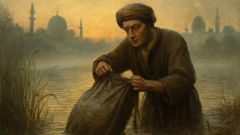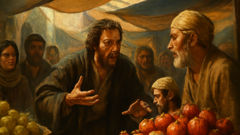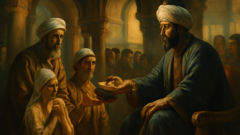Introduction
In the golden heart of medieval Baghdad, where the Tigris shimmered beneath arching bridges and the city’s bustling life wove intricate patterns of fate, stories carried on the wind. These were stories of caliphs and commoners, of laughter echoing in fragrant bazaars and secrets whispered in the hush of moonlit gardens. The greatest city in the world, they called it—where the world’s riches, wonders, and ambitions converged. Merchants jostled in crowded souks beneath striped awnings; veiled women strolled by fountains blooming with lilies; street poets and beggars danced with words while the muezzin’s call braided the hours. Above this living tapestry reigned Caliph Harun al-Rashid, whose court glittered with learning and intrigue. Yet beneath the city’s polished surface, shadows always lingered, and it was on a sultry spring morning that those shadows deepened, forever etching a tale into the city’s soul.
The story begins with a river and an apple. The river, swift and tireless, carried secrets as easily as it bore traders’ rafts. The apple—a fruit as ordinary as any in Baghdad’s orchards—would, through a chain of bewildering events, change destinies and demand answers. In those days, justice was swift, and the Caliph, renowned for his wisdom and severity, trusted only one man with matters most grave: his vizier, Ja’far ibn Yahya. Ja’far, burdened by the weight of empire and conscience, was neither a man of force nor guile, but of insight and empathy. His intellect was his sword, and on this day, he would be summoned to wield it against a riddle entwined with grief and betrayal.
The murder that shocked the city began not with a scream, but with a fisherman’s net. From the slow swirl of the Tigris, the fisherman drew not just the day’s catch, but a heavy sack. Inside: the body of a young woman, pale as moonlight, her life cruelly ended. The city’s heartbeat faltered. Whispers flew from the riverside to the palace, twisting through the alleys, until they reached the Caliph’s ears. Enraged and unsettled, Harun al-Rashid demanded justice. He gave Ja’far just three days: find the murderer, or face execution himself.
What follows is not just a search for a killer, but a journey through the lives of Baghdad’s people: the hopes of a husband, the devotion of a slave, the secret of a rare apple, and the unyielding pursuit of truth in a world layered with love, jealousy, and sorrow. As Ja’far races against time, each clue will peel back another layer, drawing us deeper into a labyrinth of human longing and fate—reminding us that in the City of Peace, every life is a story waiting to be told.
The Fisherman’s Discovery and the Caliph’s Command
The day began like any other for Farid the fisherman. Before sunrise, he threaded his way past sleeping houses to the river’s edge, his net slung over his shoulder, his thoughts drifting with the current. The air was cool, thick with the scent of river reeds and distant baking bread. As his net danced in the murky water, Farid dreamed of luck—a fat carp, perhaps, or enough silver to mend his leaking roof. Instead, the net snagged something heavy, dragging him to his knees. He heaved, heart pounding, and found a sodden sack tangled with twine.

No fish struggled within. When Farid pried open the sack, his breath caught: a woman’s body, her face serene, her skin waxen. She wore the simple robes of a merchant’s wife, but her beauty was unmistakable even in death. No wound marked her flesh; only a faint bruise marred her throat. Farid recoiled, whispering a prayer, and ran to raise the city guard.
By midday, the news had reached the palace. The Caliph’s black-clad guards whisked Farid and his grisly discovery through throngs of curious onlookers. The grandeur of Harun al-Rashid’s court did little to dispel the gloom that had settled over the city. The Caliph himself sat brooding beneath gilded arches, his piercing eyes sweeping the assembled officials. The sack was opened before him. The court fell silent.
“Who would commit such a crime in my city?” Harun thundered, his voice echoing across marble columns. His face, usually composed, now betrayed anger and sadness. “My justice will be swift. Vizier Ja’far, you have three days. Find the murderer, or your life will pay for hers.”
Ja’far bowed deeply, though his heart trembled. He studied the body, noting details—the way her fingers curled, the fine silk at her wrist, the faint scent of pomegranate that clung to her hair. The crowd murmured. Farid swore he had never seen her before; the guards attested no one had passed near the river all night. Ja’far requested her body remain untouched for further examination and ordered his most trusted aides to search for clues along the riverbank.
He withdrew to his private chamber to ponder. The Caliph’s threat weighed on him, but so did the woman’s lost story. Who was she? Why had she been killed and cast away so callously? Ja’far knew that, in Baghdad, every life intersected with another. Somewhere, someone mourned this woman—or feared her return. He vowed to find the thread that would unravel this mystery, even as time began to slip away like water through his fingers.
The Search for Clues: The Husband and the Apple
Ja’far’s investigation began at the city’s heart: the bustling marketplaces and winding lanes where rumor traveled faster than the wind. He questioned merchants who lined their stalls with pomegranates, figs, and apples of every shade. He listened to chatter in teahouses and watched the faces of servants who scurried past. But no one admitted knowledge of the murdered woman’s identity.

On the second day, a trembling man arrived at the palace gate—a merchant named Hassan. His robe was torn, his eyes rimmed with red. “My wife!” he cried. “She has vanished. I have searched for days. Please—does your lord know anything of her fate?”
Ja’far’s heart ached as he led Hassan to view the body. The merchant collapsed in grief, clutching her hand, his sobs wracking the chamber. Through broken words, he told his tale: “She begged for apples—three, she said, to ease her illness. I scoured every market in vain. At last, in a distant quarter, I found a fruit-seller who boasted of rare apples from beyond Basra. I bought three at great price, brought them home… Yet soon after, she vanished.”
Ja’far pressed him for more. Hassan recounted every detail: the heated words with a jealous slave, the fruit’s journey through his home. He claimed to have seen no one suspicious, but his guilt gnawed at him. “If I had not left her… if I had not scolded our servant…”
Intrigued by the apples, Ja’far dispatched men to scour Baghdad’s markets for rare fruit and those who trafficked in them. He questioned Hassan’s household: the slave, sullen and defensive; the neighbors, who remembered only the merchant’s frantic search. Ja’far found a strange knot in the story—the apples, so prized and costly, had vanished. Where had they gone?
That night, Ja’far wandered the palace gardens, pondering. Beneath a cypress tree, a small boy played with a red apple, its skin dappled gold. Ja’far knelt beside him. “Where did you find such a treasure?” he asked gently.
The boy’s eyes sparkled. “My father brought it home. He said he found it with a slave who tried to sell it for coin.”
A jolt ran through Ja’far. He pressed the child for details, then hurried to question the boy’s father—a humble porter. The man admitted to finding the apple in the hands of a passing slave, who claimed it came from his master’s home. The threads began to tangle: the merchant’s missing apples, the jealous slave, the murdered wife. As dawn neared, Ja’far realized he was closer to the truth than he had dared hope—but time was running thin.
Unraveling the Mystery: Confessions and Consequences
On the third day, with his life hanging in the balance, Ja’far summoned the merchant Hassan and his slave to the palace court. The Caliph presided, his expression severe. Ja’far presented his findings: the apple’s path from merchant to wife, from wife to slave, and from slave to the city’s streets.

Pressed by the Caliph’s fierce gaze, the slave broke. Tears streaming down his cheeks, he confessed: “I was jealous of my master’s favor for his wife. When I saw her with the apple, I stole one, thinking to sell it for coin. But in the street, I met a porter who wished to buy it for his son. I agreed, then feared my theft would be discovered. In panic, I returned home, but my mistress confronted me. We argued—she threatened to tell my master. In anger and fear, I struck her. She fell… she did not rise.”
The court gasped. The Caliph’s anger was terrible to behold. “You have not only killed an innocent woman but shamed your master’s house and sown grief throughout Baghdad,” he thundered.
But Ja’far, his mind sharp with details and his heart aching for all involved, asked Hassan if this story matched his knowledge. Hassan wept and nodded. “If only I had not scolded my slave… if only I had not left my wife alone…”
The apple—a symbol of desire and chance—had rolled from hand to hand, drawing tragedy in its wake. Ja’far laid out every thread, from Farid’s net on the river to the laughter of a child in the garden. The Caliph listened as Ja’far recounted how jealousy and fear could twist the ordinary into the fatal.
Harun al-Rashid pronounced judgment, tempered by Ja’far’s pleas for mercy. The slave would pay for his crime, but Hassan’s guilt, too, would be atoned for by charity to widows and orphans. Ja’far’s life was spared, but he carried the burden of this tale for years—a reminder that every choice ripples outward, that in the city of Baghdad even a simple apple might bear the weight of fate.
Conclusion
Thus ended the tale of the three apples—a story that would echo through Baghdad for generations. In the days that followed, the city gradually returned to its rhythm, yet the lessons lingered. The Caliph, known for his uncompromising justice, was haunted by the knowledge that tragedy sometimes springs not from villainy but from misunderstandings and small cruelties left unchecked. Vizier Ja’far’s wisdom became legendary, a symbol of compassion woven with clarity, reminding all who heard the tale that justice is not only about punishment but about seeing into the tangled heart of human lives.
The three apples, once ordinary fruit, became tokens of fate—a reminder to cherish kindness, to temper anger, and to question the stories we tell ourselves before judgment is passed. In time, mothers whispered the story to restless children; scholars debated its meanings in candlelit libraries; merchants eyed their wares with a new sense of humility and care. For in Baghdad, as everywhere, every life is linked, every act—however small—can change the course of many.
Ja’far himself lived on as a legend in countless tales, but he was never again so careless as to see only the surface of a story. And so, in the City of Peace, where justice and mercy strive together, the tale of the three apples was not just a record of tragedy but a lesson in understanding—and in hope.













